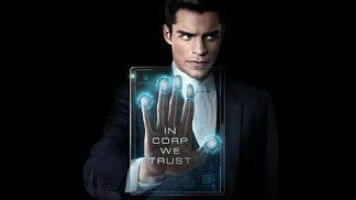Incorporated is more corporate drone than maverick

Real-life calamity might prompt an uptick in dystopian fiction, but it’s hardly needed to get the ball rolling. For proof, look no further than the recent glut of YA offerings (and their already diminishing returns) that rolled out during a time of affordable health care and an unemployment rate below the historical median. But with the works of authors like William Gibson and Octavia Butler now looking more prescient than ever, reality is keeping up with fiction at an alarming rate. Science fiction may be as much a reflection of the present as it is a look at a bleak future, but it’s becoming increasingly difficult to distinguish between the two, with corporations running amok, sea levels rising, and fascism rearing its ugly head.
Such post-apocalyptic visions make up Syfy’s newest drama, Incorporated, from Àlex and David Pastor. The Self/Less screenwriters had some famous patrons in Ben Affleck and Matt Damon, who helped land the series order early this year. But even though Affleck and Damon have each had a chance to pop up in some grim future, it’s executive producer Ted Humphrey who really seems to have put his stamp on this new thriller. The former Good Wife writer’s well-versed in office politics and corporate double dealing; appropriately enough, he’s helped create a world in which biotech companies are de facto world powers, and a promotion can be a life-or-death prospect.
Title cards reveal that it’s the year 2074, a time in which Milwaukee is a balmy paradise, bacon costs $600 a pound, and “food porn” isn’t just a figure of speech. But the backdrop to those humorous flourishes is a planet ravaged by famine, thanks in part to climate change. This bleak world has been conveniently color-coded: The haves dwell in the cushy Green Zone, while the Red Zone hosts everyone not in league with one of the dueling biotech companies, Spiga and Inazagi. The Red Zoners are the indigent and abandoned, as well as the dissolute and lawless. Of course, those last two characteristics are a matter of perspective—these people are doing whatever they need to do to survive. The Green Zone inhabitants face somewhat similar pressures, as they have to constantly prove their worth and loyalty.
But even though there are fatal repercussions for illegal downloads at work, it’s clear that the Green Zoners are the enviable parties here. This is the world that Ben Larson (Sean Teale), né Aaron, has infiltrated. He’s a former Red Zoner and current member of an opposition group that’s embedded itself within the luxurious confines of the Green region. He’s looking for an old friend (or flame), and he’s willing to risk the whole operation to do so. In order to be the hero, he has to blend in with the villains. But he can only do that by keeping one foot in the Red Zone.
It’s quite a bind that Ben’s in—life in the Green Zone is so good that anyone who appears less than satisfied is suspect. Teale’s layered performance deftly teases Ben’s inner conflict, even as he flashes waxen smile after smile to make his way up the corporate ladder. He’s also allowed to play more than the sycophant during flashbacks and trips to the Red Zone. These are more than just expository journeys; they lend emotional heft to the series, and provide a nice counterpoint to the controlled setting of the Green Zone, which still has plenty of simmering tensions.
As for the rest of the cast, Dennis Haysbert is reliably menacing as Julian, the head of Spiga’s torture department who might not enjoy the wet work as much as his ascension suggests. Julia Ormond’s Elizabeth is bland at first, though that could be a matter of characterization. As Spiga CEO, she’s one of the most powerful people alive—who’s literally keeping food out of people’s mouths—but Ormond sometimes struggles to display a sufficiently cold demeanor to match the script. She could be letting Elizabeth’s feelings about her estranged daughter Laura (Allison Miller) distract her. Like Ben, Laura’s having trouble keeping up the facade. Miller keeps up with her co-star, readily pivoting between biotech scion and guilt-ridden survivor.
Unfortunately, the quality of the performances is a bit one-sided; even though they’re literally more colorful, the Red Zone inhabitants are mostly just teeming masses for a good chunk of the first half of the season. The standouts are Terrence, a black-market dealer; Theo, a reluctant cage fighter; and Iliana, Theo’s sister who’s held captive in the Green Zone. They’re a bit more single-minded than their Green Zone counterparts, which limits the performances. It’s inadvertently another example of the inequality therein.
Incorporated’s other glaring problem is that it might be a little too timely. Just like the well-appointed dwellings of its Green Zone, Incorporated complements the current TV and sociopolitical landscape well. Its dystopian bent is de rigueur, so much so that the series suffers from the other side of that savvy coin—it’s almost indistinguishable from its counterparts. The steely, sterile environs of the corporate headquarters can be found in everything from High-Rise to the Divergent series (coming soon to a TV near you, interestingly enough). Right now, it’s following its lead character’s suit and hiding in plain sight.